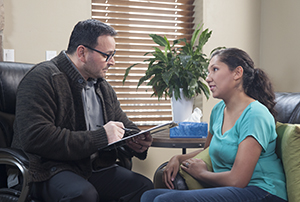Understanding Social Phobia (Social Anxiety Disorder)
Understanding Social Phobia (Social Anxiety Disorder)
You have to give a presentation next week. Just thinking about it makes your heart race. Your throat gets tight, and you can hardly breathe. Sometimes, you even feel faint. Speaking in front of a group makes most people nervous, but your fear is beyond reason. This is nothing to be ashamed of. You may have an anxiety disorder known as social phobia. Talk to your doctor or mental health professional. He or she can offer treatment and support.
What is social phobia?
Social phobia (also called social anxiety disorder) is an intense fear of being humiliated in a social or work setting. Even if you realize that your worries are irrational, you still expect people to judge and think poorly of you. To avoid the anxiety, you may stay away from group settings. This avoidance can create problems with relationships, your job, and many other parts of your life. And it can make life much less enjoyable.
What causes it?
The exact cause of social phobia isn’t known. It may run in families. The balance of certain chemicals in your brain may also play a role. And an embarrassing or traumatic event may trigger social phobias in some people. Sometimes, the social phobia may not appear until years after this event.
How does social phobia feel?
People with social phobia are very conscious of how others see them. In a social setting, symptoms may include:
Self-conscious thoughts (You may think all eyes are on you)
Shakiness, nervousness, or a trembling voice
Sweating and blushing
An increased heartbeat
Shortness of breath
A headache or stomachache
Muscle tension
A dry mouth
Getting help
Asking for help may be very hard for you, but the effort will be worth it. Certain medicines may lessen your symptoms. And behavioral therapy may help you conquer your fears. This involves working with your therapist to learn how to relax when you feel anxious. Educate yourself about social phobias and keep track of helpful online resources and books you can use during stressful periods. You may also want to try stress management techniques such as meditation, and consider online or in person support groups. You’ll also slowly start to confront your fears. At first, you may just think about the situations that scare you. Later, you may face them in person. For instance, you might start by giving a speech in front of one friend, and then gradually in front of larger groups. With each step, you’ll become less afraid.
Updated:
February 21, 2018
Sources:
Approach to treating social anxiety disorder in adults, Up To Date, Pharmacotherapy for social anxiety disorder in adults, Up To Date
Reviewed By:
Ballas, Paul, DO,Fraser, Marianne, MSN, RN
